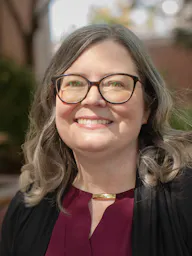
AnnaMarie Conner
- Professor and Director of Graduate Studies for Math Ed
Department of Mathematics, Science, and Social Studies Education - On-Site Instructor
Professional Development School District
Areas of Expertise
- Mathematics teacher education
- Argumentation and collective argumentation
- Teacher beliefs
- Discourse
- Proof
- STEM Education
Interests
- Mathematics teachers' facilitation of argumentation
- Teacher beliefs
- Prospective teachers' beliefs about proof
- Teacher identity
- Integrated STEM education
- Argumentation in integrated STEM
Concentrations
Education
- PhD in Curriculum and Instruction: Mathematics Education, 2007
The Pennsylvania State University - MA in Mathematics, 2007
The Pennsylvania State University - MS in Curriculum and Instruction, 2000
Philadelphia Biblical University - BS in Mathematics, 1995
Wheaton College
Contact
Research Summary
My research examines teachers’ beliefs about mathematics, teaching, and proof and how this relates to their support for students’ arguments in secondary mathematics classes. In CAREER: Learning To Support Productive Collective Argumentation In Secondary Mathematics Classes, funded by the National Science Foundation, I followed a cohort of secondary mathematics teachers through their on-campus coursework, student teaching, and into their first three years of teaching to examine how they learn to support collective argumentation in mathematics classes. As part of this work, I investigated how their identities as teachers of mathematics develop and grow through their experiences. With my research team, I am currently investigating how teachers’ displays of mathematics are important to student participation in argumentation.
I am working with others in the Mary Frances Early College of Education and the College of Engineering to explore how elementary teachers can support argumentation in their teaching of mathematics, science, and coding in the CALC (Collective Argumentation Learning and Coding) project. In this project, we are updating and refining a framework for teacher support for argumentation to include STEM content. We are also learning how teachers support students in making arguments within and across disciplines.
Grants
Elementary school teachers impact student motivation to pursue STEM fields of study and careers and are being increasingly asked to emphasize key STEM content areas such as computer science in their teaching. The CALC project, funded by NSF, designed a practice that elementary school teachers can use to integrate the teaching of coding using argumentation, a standard practice already used to teach mathematics, science, and other curriculum content.
The project also developed a model course that prepares teachers to educate students in interdisciplinary, holistic ways to learn mathematics, science, and coding and equips them to guide students through reasoning processes while learning to code.
Awards and Accolades
University of Georgia College of Education, 2019
Association of Mathematics Teacher Educators, 2020